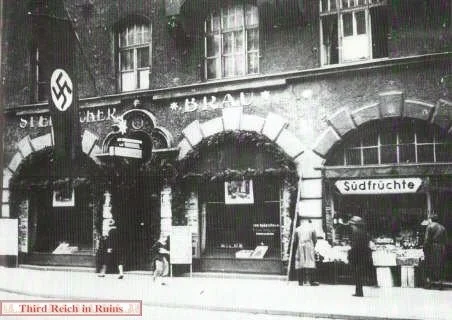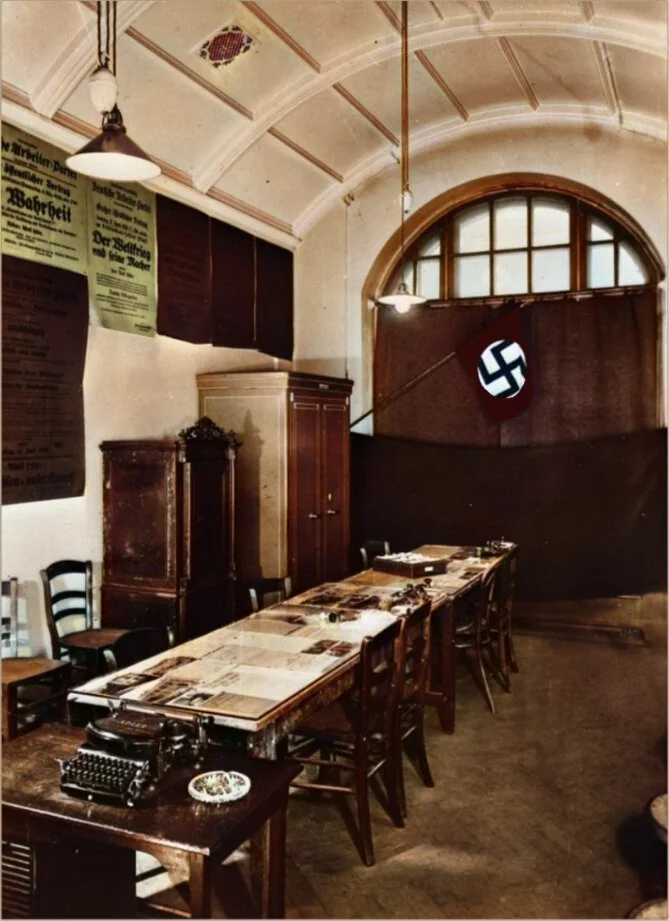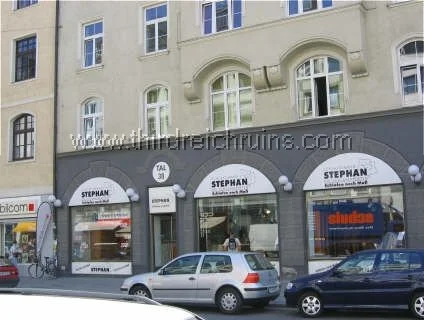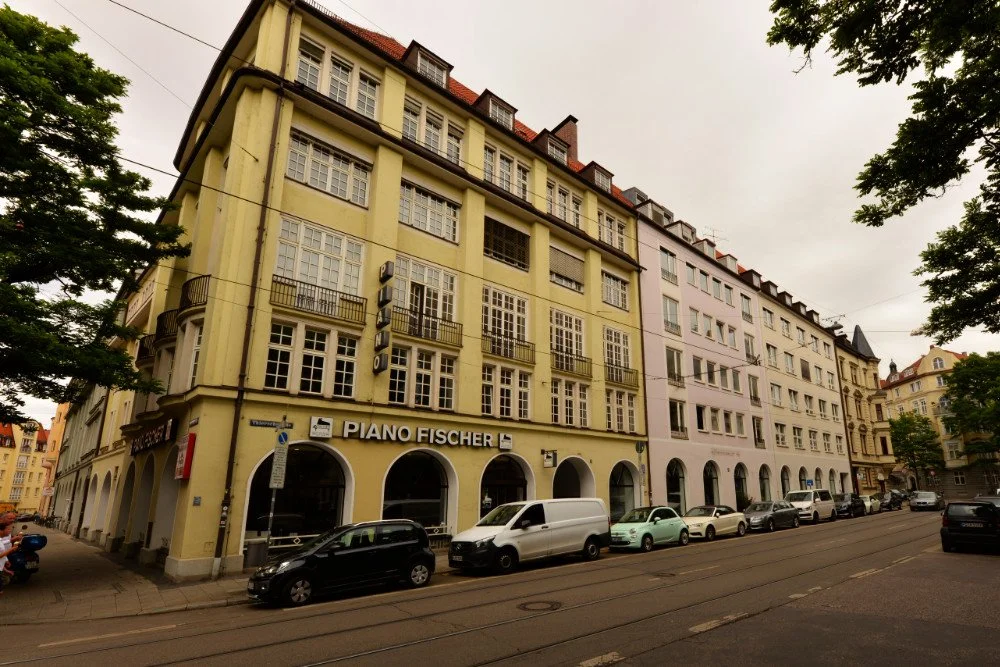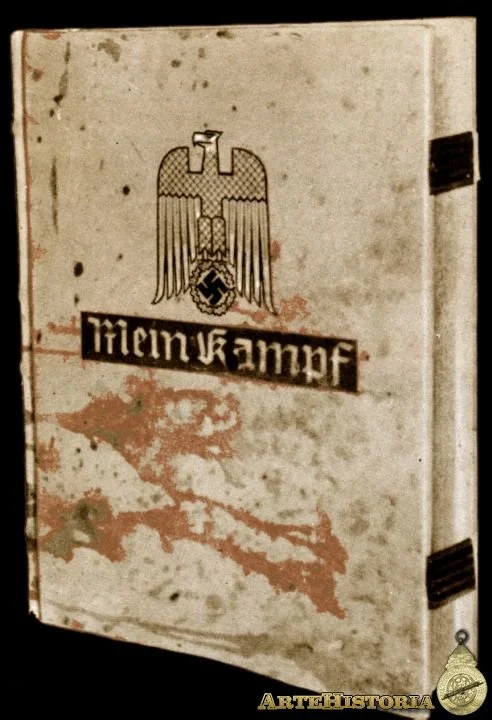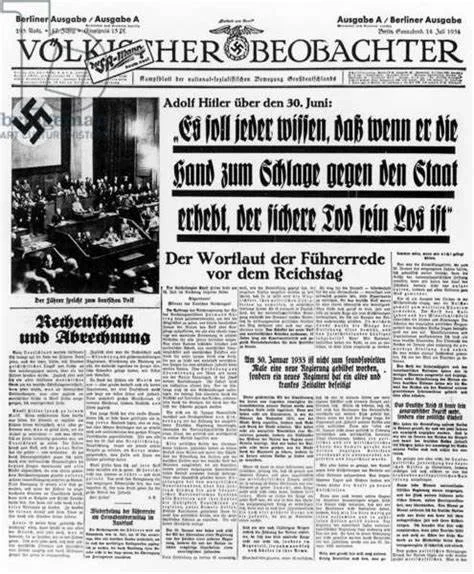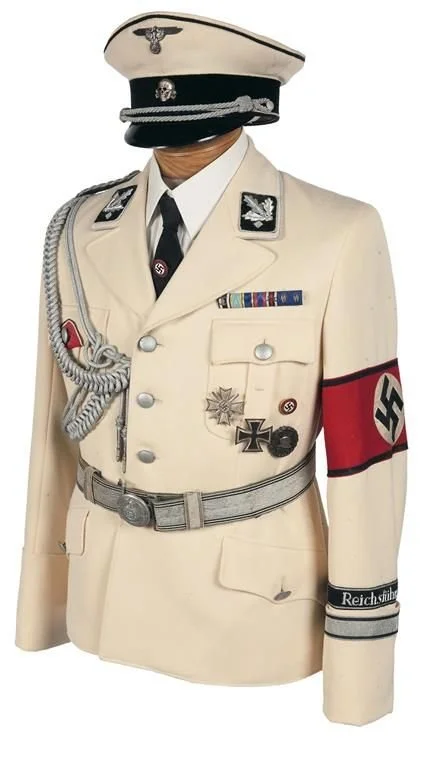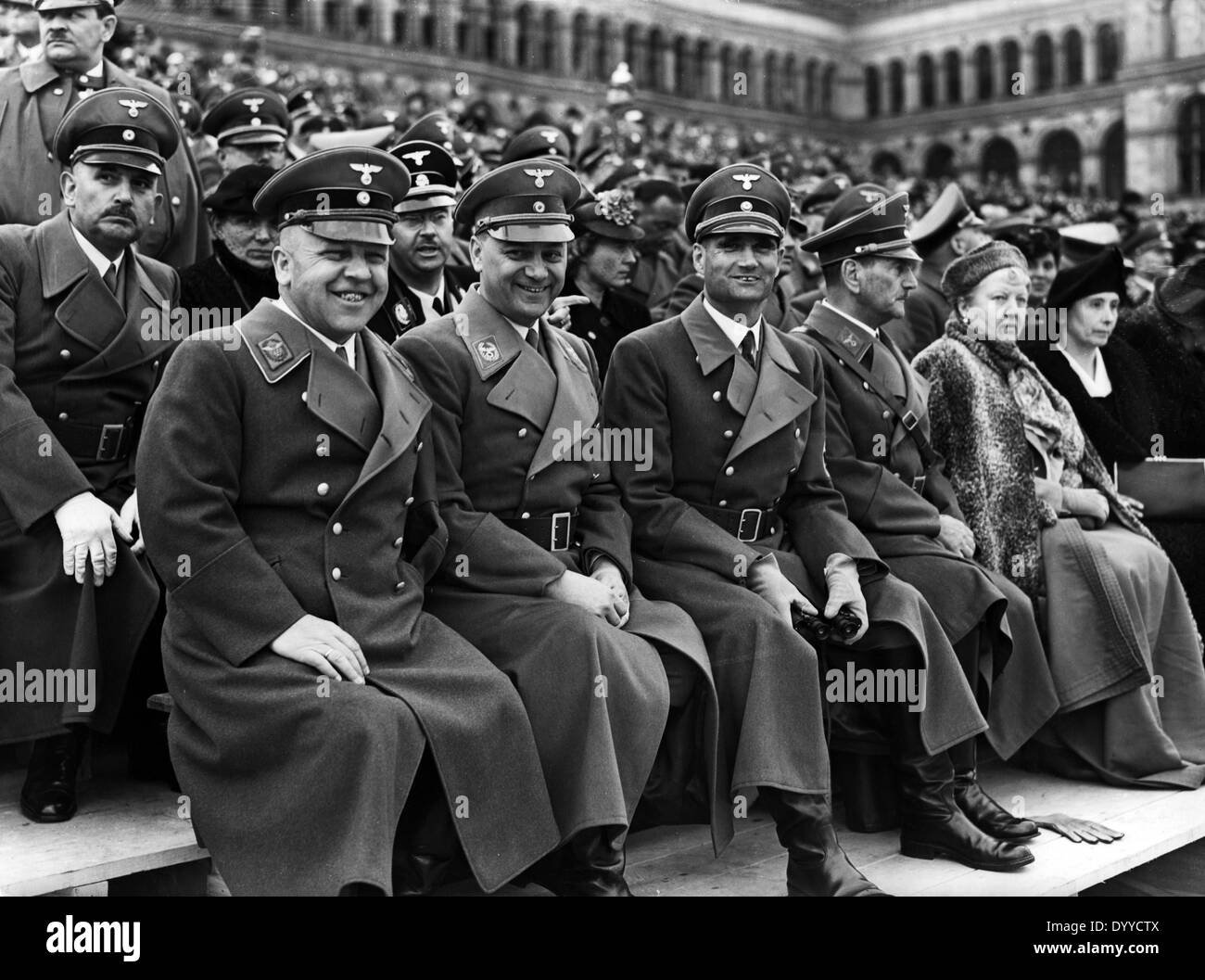
Max Amann
Amann was Adolf Hitler's company sergeant in World War one. Amann joined the Nazi Party in October 1921, as the Party's first business manager, and held NSDAP membership number 3.
Max Amann was born into a Catholic family in Munich, Germany, on 9th February, 1902. After leaving school he joined the German Army. During the First World War he was a sergeant in the 1st Company of the 16th Bavarian Reserve Infantry Regiment where he met Adolf Hitler.
Amann recommended Hitler for officer training. However, Fritz Wiedemann, Hitler's regimental adjutant, rejected the idea as he considered Hitler lacked leadership qualities. He wrote in his memoirs, The Man who Wanted to Command (1964): "By military standards Hitler really didn't at that time have potential for promotion. I'm disregarding the fact that he wouldn't have cut a specially good figure as an officer in peacetime; his posture was sloppy and when he was asked a question his answer would be anything but short in a soldier-like fashion. He didn't hold his head straight - it was usually sloping towards his left shoulder. Now all that doesn't matter in wartime, but ultimately a man must have leadership qualities if you're doing the right thing when you promote him to be a non-commissioned officer."
After the war he attended business school and worked in a Munich law firm. Hitler later recalled that in 1920 he was walking along a busy street in Munich when he met Amann, whom he had not seen since the end of the war. According to James Pool, the author of Who Financed Hitler: The Secret Funding of Hitler's Rise to Power (1979): "Amann was not particularly interested in politics, but at Hitler's prompting he attended a Nazi meeting and soon afterward became a Party member. He was a strong, active-looking little man with a heavy head set on a short neck that was almost invisible between his shoulders. His physical appearance gave no hint of Amann's intelligence. He was a former law student and after the war had obtained a good job in a mortgage bank."
Hitler suggested that Amann should become the full-time business manager of the National Socialist German Workers Party (NSDAP). Amann rejected the offer with the argument that he had secure career prospects and a pension to look forward to at the bank, while employment by the little Nazi Party would mean a substantial cut in salary and an uncertain future. Hitler replied "What good will your pension be if someday the Bolsheviks string you up from a lamppost?" Amann considered the offer for three days before finally accepting the job.
Hitler later explained: "On my request, party comrade Amann took over the position of party business manager. He told me at once that further work in this office was absolutely impossible. And so, for a second time, we went out in search of quarters, and rented an old abandoned inn in Corneliusstrasse, near the Gartnerplatz.... A part of the old taproom was partitioned off and made into an office for party comrade Amann and myself. In the main room a very primitive wicket was constructed. The S.A. leadership was housed in the kitchen."
The Deutscher Arbeiterpartei (DAP - German Workers Party) was founded in the hotel Fürstenfelder Hof in Munich on 5 January 1919. When the Party reorganized as the Nationalsozialistische Deutsche Arbeiter Partei (NSDAP - National Socialist German Workers Party), it had offices in the Sterneckerbräu brewery at Tal 54, near the city center (the address on the street side is now Tal 38 - currently a computer store). The Party had its offices here from 1 January 1920 until 31 October 1921. The official Party platform was formulated here on 24 February 1920, and Adolf Hitler (who had joined the previous autumn) outlined the Party program to the public in the famous Hofbräuhaus beer hall that same evening. (National Archives, RG 242-HB)
Amann, as business manager, was given control over the recently acquired newspaper, Völkischer Beobachter. He also became director of the NSDAP publishing house, Eher Verlag. William L. Shirer described Amann as "a tough, uncouth character but an able organizer". James Pool believed that Hitler had made an excellent choice in Amann. "Efficient, parsimonious, incorruptible, and without personal political ambition, Amann was exactly the right man for the job. He brought a commonsense business approach to Party affairs." It was said that his motto was "Make propaganda pay its own way." Hitler later praised Amann in particular for his financial management of the Party newspaper: "The fact that I was able to keep the Völkischer Beobachter on its feet throughout the period of our struggle - and in spite of the three failures it had suffered before I took it over - I owe first and foremost to... Amann. He as an intelligent businessman refused to accept responsibility for an enterprise if it did not possess the economic prerequisites of potential success."
The Franz Eher publishing house was located in this building and was the central publishing house of the NSDAP.
The NSDAP bought these, including the accompanying bookstore, in 1920.
Amann took part in the Beer Hall Putsch. On 9th November, 1923, Amann, Adolf Hitler, Hermann Kriebel, Eric Ludendorff, Julius Streicher, Hermann Goering, Max Scheubner-Richter, Wilhelm Brückner and 3,000 armed supporters of the Nazi Party marched through Munich in an attempt to join up with Roehm's forces at the War Ministry. At Odensplatz they found the road blocked by the Munich police. What happened next is in dispute. One observer said that Hitler fired the first shot with his revolver. Another witness said it was Streicher while others claimed the police fired into the ground in front of the marchers. William L. Shirer has argued: "At any rate a shot was fired and in the next instant a volley of shots rang out from both sides, spelling in that instant the doom of Hitler's hopes. Scheubner-Richter fell, mortally wounded. Goering went down with a serious wound in his thigh. Within sixty seconds the firing stopped, but the street was already littered with fallen bodies - sixteen Nazis and three police dead or dying, many more wounded and the rest, including Hitler, clutching the pavement to save their lives."
Hitler and his followers were arrested and put on trial for treason. Hitler was found guilty he only received the minimum sentence of five years. Ludendorff was acquitted and the others, like Amann, although found guilty, only received very light sentences. Over 40 members of the Nazi Party were sent to Landsberg Castle in Munich to serve his prison sentence.
Amann proposed that Hitler should spend his time in prison writing his autobiography. Hitler, who had never fully mastered writing, was at first not keen on the idea. However, he agreed when it was suggested that he should dictate his thoughts to a ghostwriter. The prison authorities surprisingly agreed that Hitler's chauffeur, Emil Maurice, could live in the prison to carry out this task.
Maurice, whose main talent was as a street fighter, was a poor writer and the job was eventually taken over by Rudolf Hess, a student at Munich University. Hess made a valiant attempt at turning Hitler's spoken ideas into prose. However, the book that Hitler wrote in prison was repetitive, confused, turgid and therefore, extremely difficult to read. In his writing, Hitler was unable to use the passionate voice and dramatic bodily gestures which he had used so effectively in his speeches, to convey his message. The book was originally entitled Four Years of Struggle against Lies, Stupidity, and Cowardice. Amann reduced it to My Struggle (Mein Kampf). The book is a mixture of autobiography, political ideas and an explanation of the techniques of propaganda.
After being released from prison he was elected to the Munich city council. In 1933 he represented the Nazi Party in the Reichstag. In November, 1933, Amann became President of the Reich Association of German Newspaper Publishers. In this role he established Nazi control over the industry and gradually closed down those newspapers that did not fully support Adolf Hitler.
Hitlers Cell at Landsberg Prison
Landsberg Prison today.
Amann’s copy of Mein Mampf
The Völkischer Beobachter (Peoples observer) enabled Hitler to put across his political message. He also recruited Heinrich Hoffmann as his official photographer, who travelled with him everywhere. William L. Shirer said his "loyalty was doglike".
Hitler's chauffeur, Erich Kempka, pointed out: "The administrator of his property and his money was Max Amann in his capacity of director of the Eher Verlag, which published Mein Kampf. Once or twice a year Amann would drop in on Hitler to present his accounts. At such times he would always bring up his wishes with regard to newspapers and book publishing and would ask Hitler for authority in various matters. He was seldom or never refused. Whether his unassailable position with Hitler was due more to his capacity as the Fiihrer's business agent or to his having been the sergeant of Hitler's company during the First World War, was a subject much discussed among Hitler's intimates. In financial matters Hitler was ignorant, but generous. As a private person he did not know how to handle his own money, and as head of state he could not manage the government budget."
In a speech he made in Nuremberg in 1935, Amann explained why it was necessary to ban opposition newspapers: "A look back before our seizure of power reminds us how numerous the problems of the press once were. Our few newspapers with their limited circulations fought heroically in the front lines to gain power. They stood against several thousands newspapers that represented other ideas and interests. There were many differences between the leading newspapers back then, but there was one thing they all lacked when compared to the National Socialist press: they had lost their connection to the people. They were responsible not to the people, but to some other group, be it parties, churches, economic interests or corporations, or they looked to their own good without considering the general good of the people. Such a press promoted class struggle, the confusion of social standing, religious incitement or moral decay. They did not promote the good of the individual and the strengthening of the community, rather collapse and decay. These newspapers that appealed to people's lowest instincts had lost their national and moral sense of responsibility, and had little influence. Such a press could not be tolerated by National Socialism, whose task is the mobilization of all good and healthy strengths of the individual and the community, encouraging their expression and development. The German people is being rescued from a fragmentation of parties, classes, interests and special interests to enable them it to find its own nature and its own strengths once more. This requires that the whole of the German press serve German tasks. Our party's press is always a model, for it developed only to serve the idea and thereby the people."
Along with Heinrich Hoffmann, Amann was responsible for Hitler's great wealth. Amann also used his position to increase his own financial situation. Louis L. Snyder points out: "He saw to it that Hitler obtained huge fees for his contributions to the publications. Amann, too, enriched himself enormously in his service to the Nazi Party." Head of the world's largest newspaper and publishing company, Amann income increased from 108,000 to 3,800,000 marks between 1934 and 1944.
Arrested by Allied troops after the Second World War he was sentenced to ten years for war crimes in November 1948. He also lost his property and pension rights and died in poverty on 30th March 1957.
Amann with Hitler and Foxy Hiltlers Dog in WW1
Amann as an SS-Gruppenführer
Reichsleiter for the Press
Click the Uniform to view Max Amann’s Summer uniform Auction page.
Born 24 November 1891
Munich, Kingdom of Bavaria, German Empire
Died30 March 1957 (aged 65)
Munich, Bavaria, West Germany
NationalityGerman
Political partyNazi Party (NSDAP)
Other political
affiliationsGreater German People's Community
OccupationBusiness manager
Publisher
